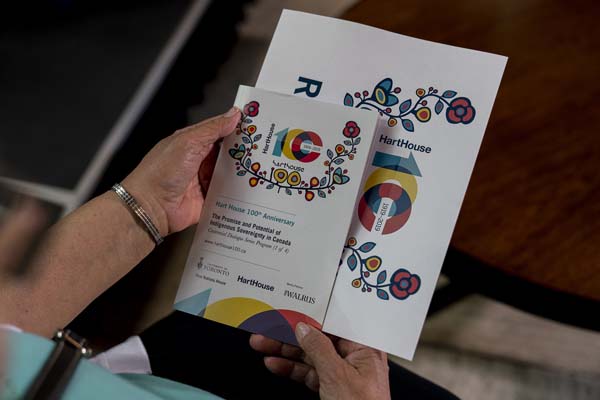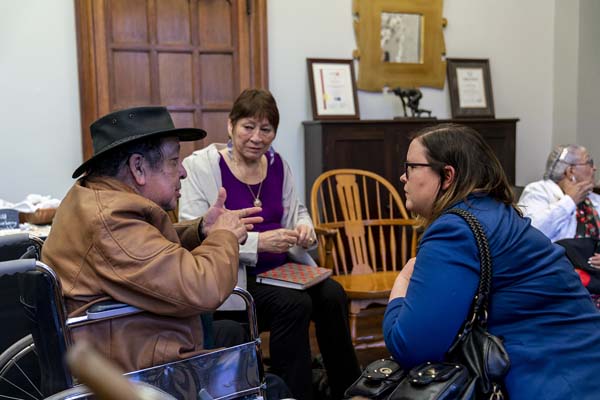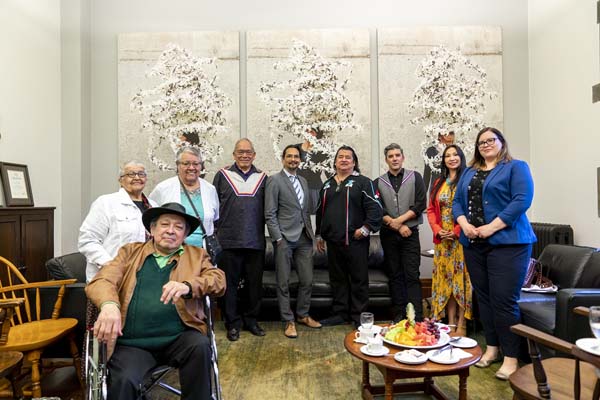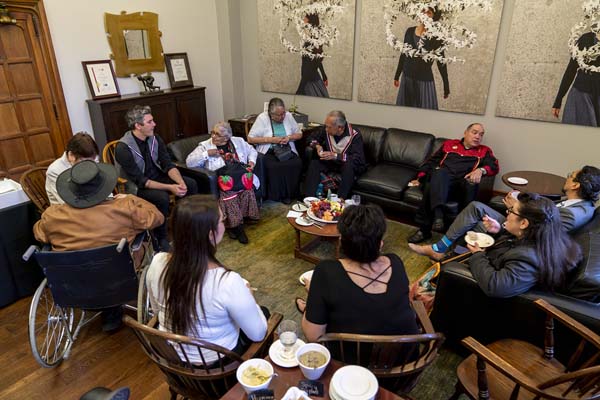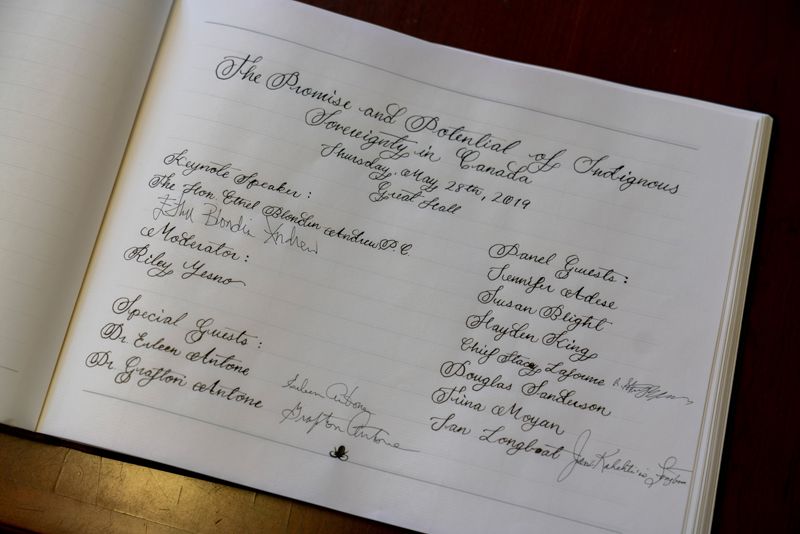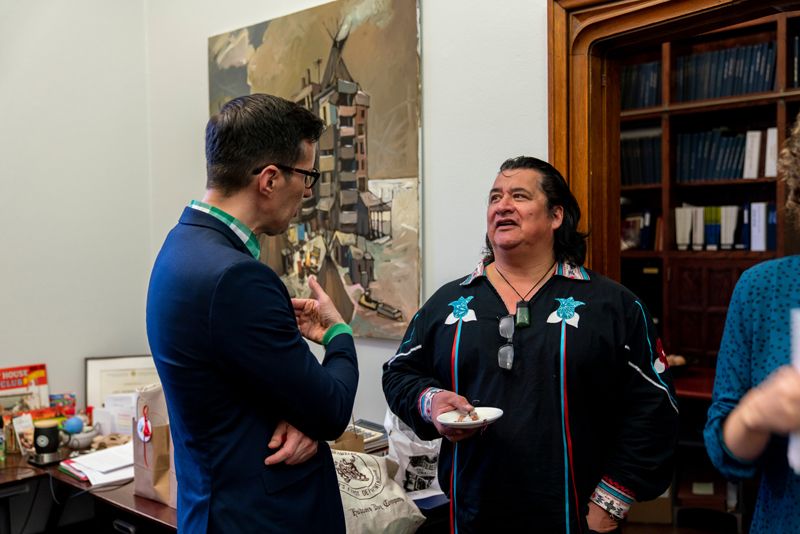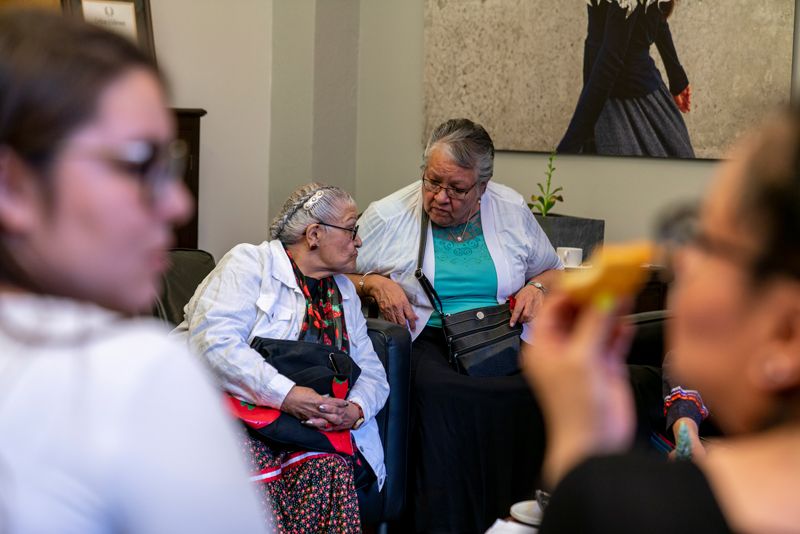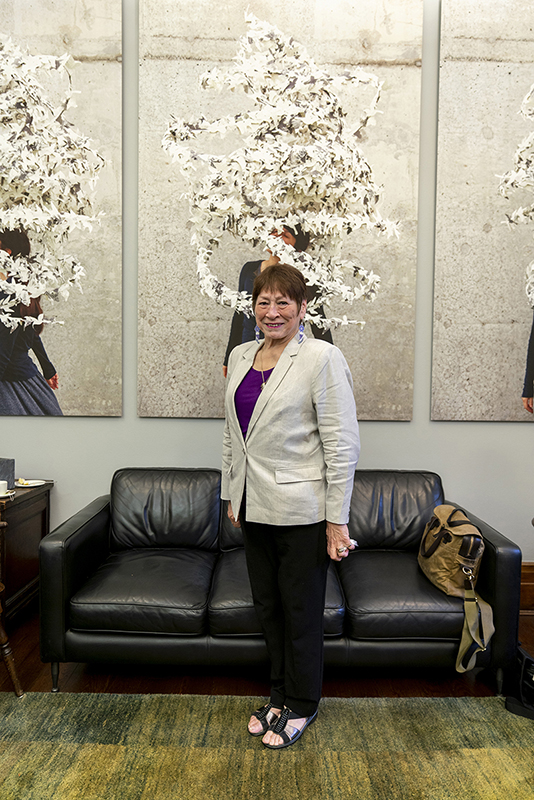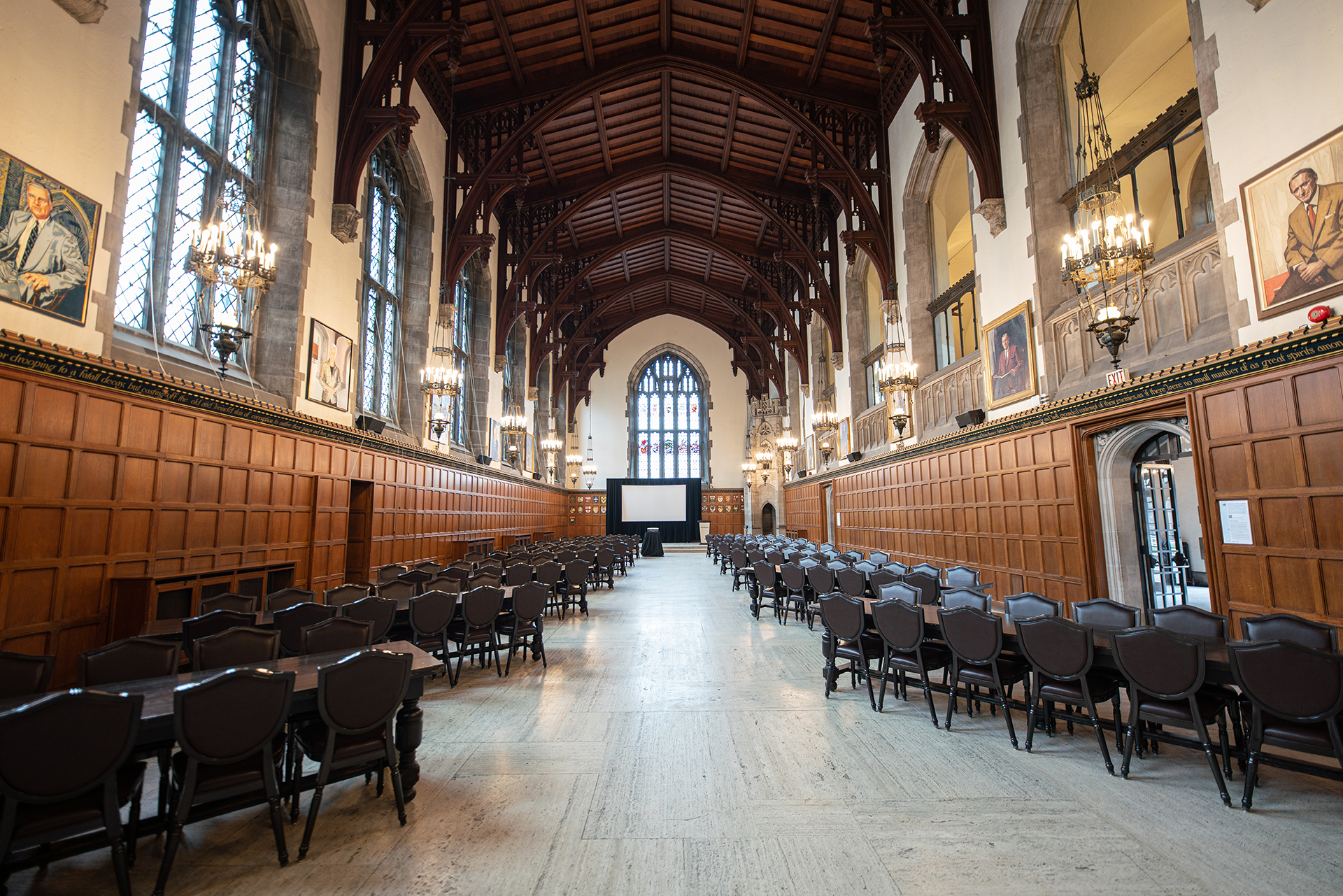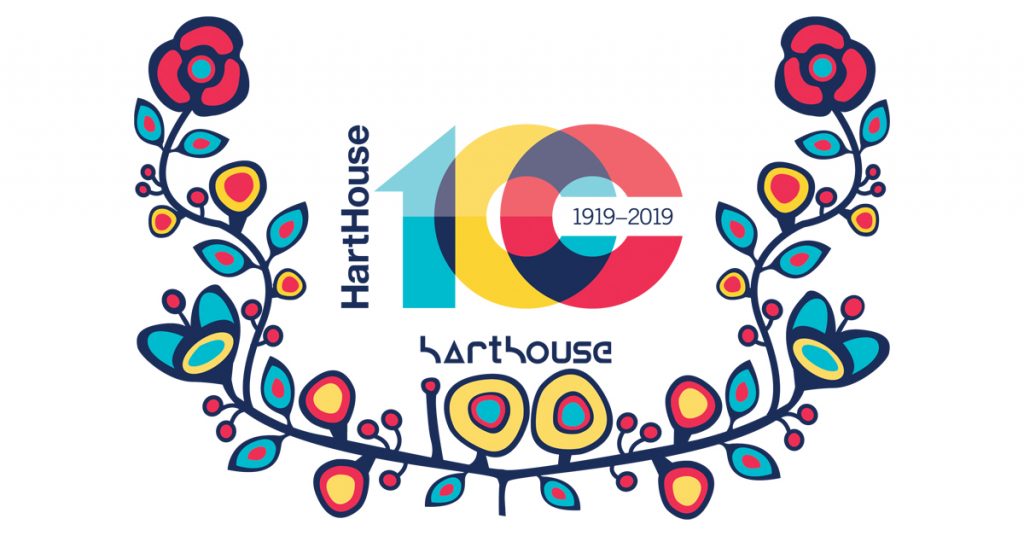
With the Hon. Ethel Blondin-Andrew, PC and other special guests.
Overview
The first installment of Hart House's Centennial Dialogue Series was an essential night of ideas, sharing and listening, as we welcomed a circle of esteemed Indigenous thinkers in conversation about the promise and potential of Indigenous Sovereignty in Canada.
Presented in partnership with Indigenous Student Services at First Nations House, University of Toronto, this event reimagined a formal debate hosted at Hart House in 1991 that featured the Hon. Ethel Blondin-Andrew, PC, the first Indigenous woman elected to the Canadian parliament, a member of Cabinet and a member of the Dene Nation.
This event offered an opportunity for Indigenous students, staff, faculty and community members to envision what Indigenous sovereignty could mean, in a conversation that provided a circle for Indigenous dialogue and a space for deep listening and learning for non-Indigenous guests.
Keynote by
-
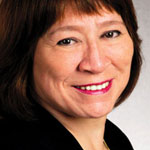 Speaker
SpeakerHon. Ethel Blondin-Andrew
PC, Dene Nation from Tulita, Northwest Territories
After graduating from the University of Alberta (BEd 1974), Ms Blondin-Andrew taught school at several Northwest Territories communities during 1974-81 before joining the territorial department of education at Yellowknife as a language specialist during 1981-84. There she became involved in policy development for the preservation of Indigenous languages and culture in the Northwest Territories.
During 1984-86 she was successively manager and then acting director of the Public Service Commission of Canada, and during 1986-88 she was assistant deputy minister of culture and communications at Yellowknife. In the 1988 general election, Ms Blondin-Andrew became the first Indigenous woman elected to Parliament when she won the Western Arctic seat for the Liberals, serving as Opposition critic for Aboriginal Affairs (now Indigenous and Northern Affairs Canada). She was re-elected in 1993, as the Liberals came to power, and was appointed Secretary of State, Training and Youth that year.
Guest Speakers
-
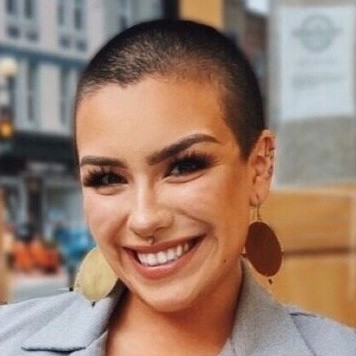 Moderator
ModeratorRiley Yesno
Riley Yesno is an Anishinaabe woman from Eabametoong First Nation who grew up in Thunder Bay, ON and currently attends the University of Toronto. Riley has spent two years providing advice to the Prime Minister and members of the federal government and has worked alongside Indigenous leaders across the country on a number of issues ranging from art-programming for youth to governance and self-determination.
Riley has spoken about Indigenous models of sustainability at the UN Conference on Climate Change’s 24th Conference of the Parties in Katowice, Poland, in Stockholm, Sweden, at the World Forum on Gender Equality, and has delivered a TEDx talk on Canadian identity. Riley is also a part-time writer and has contributed to major Canadian media outlets including Maclean’s and the Toronto Star, where she primarily covers youth and Indigenous issues. She hopes that through story-telling and building relationships she can contribute in her own way to building a better place for future generations to call home.
-
Dr. Eileen Antone
Emeritus and Elders’ Circle, University of Toronto, member of the Oneida of the Thames First Nation
Emeritus, University of Toronto. Dr. Antone is a member of the Oneida of the Thames First Nation-Turtle Clan. She is the former Director of Aboriginal Studies / Centre for Aboriginal Initiatives at the University of Toronto. Dr. Antone served as a Faculty member in the Department of Adult Education, Community Development, and Counselling Psychology, as well as the Transitional Year Programme. She currently sits on the Elders’ Circle.
-
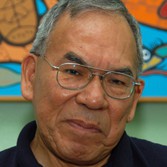
Rev. Dr. Grafton Antone
Members, Elders' Circle, University of Toronto, member of the Oneida of the Thames First Nation
Rev. Dr. Grafton Antone, Wolf Clan, is from the Oneida of the Thames First Nation. Grafton taught an Oneida language class in the Aboriginal Studies Program at the University of Toronto. Dr. Antone was also an Elder-in-Residence at First Nations House at the University of Toronto. Upon his retirement, he moved back to his community where he serves on the Oneida Long Term Care Home Committee. He also continues to be a member of the Council of Aboriginal Initiatives Elders’ Circle.
-
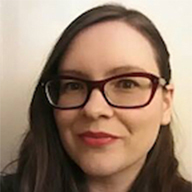
Jennifer Adese
Otipemisiw and Métis, Associate Professor of Sociology at the University of Toronto Mississauga
Jennifer Adese is an Associate Professor in the Department of Sociology at UTM. Prior to joining UTM, she was Associate Professor and Program Coordinator of Indigenous Studies in the School of Indigenous and Canadian Studies at Carleton University. Jennifer is currently working on a book project that analyzes the term “Aboriginal” and its rise to popular cultural and economic debate in the wake of the 1982 Canadian Constitution’s entrenchment of “Aboriginal rights.” She is also co-editor on the forthcoming book, New Directions in Métis Studies from UBC Press. She is also co-editing the book, Indigenous Celebrity in development for University of Manitoba Press. In addition, Professor Adese current and ongoing major research project is engaged in long-term research project that examines the historical political organizing of Métis women.
-
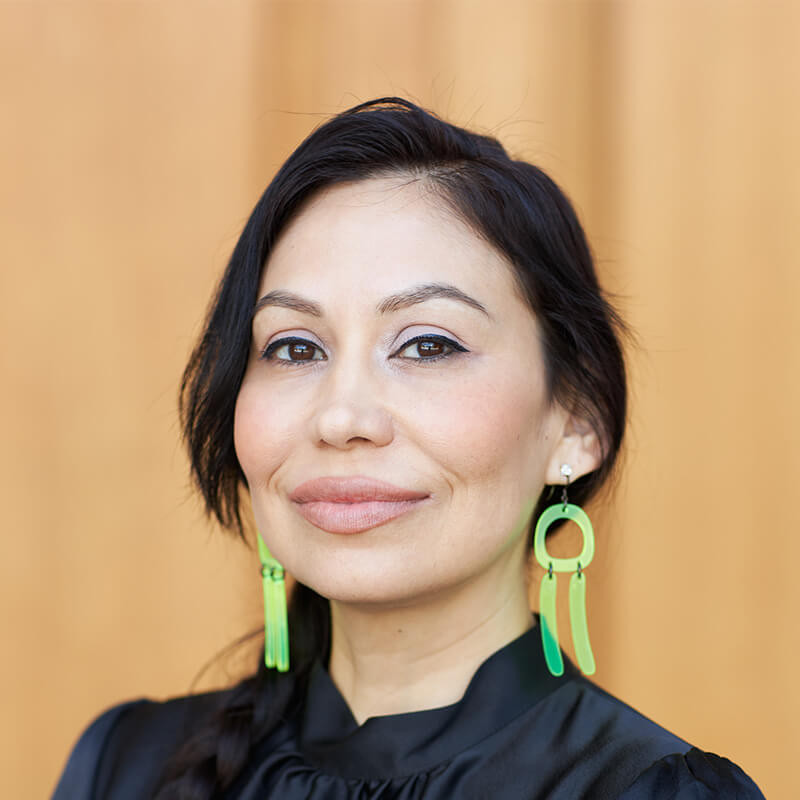
Susan Blight
Anishinaabe visual artist, filmmaker, and arts educator from Couchiching First Nation and Indigenous Student Life Coordinator at Indigenous Student Services, University of Toronto
Susan Blight (Anishinaabe, Couchiching First Nation) is an interdisciplinary artist working with public art, site-specific intervention, photography, film and social practice. Susan is co-founder of Ogimaa Mikana, an artist collective working to reclaim and rename the roads and landmarks of Anishinaabeg territory through the revitalization of Anishinaabemowin. She is also a member of the Indigenous Routes artist collective which works to provide free new media training for Indigenous youth.
-
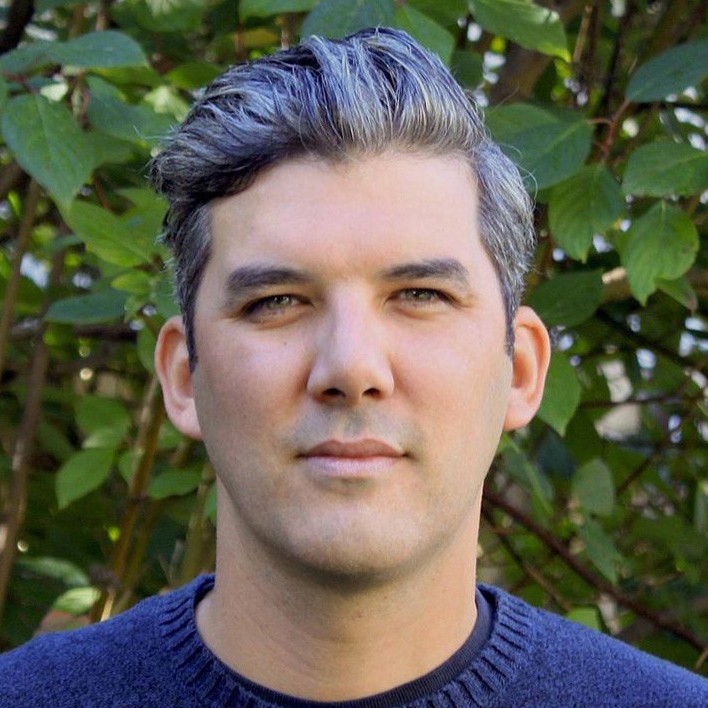
Hayden King
Advisor to the Dean, Indigenous Education / Director, Yellowhead Institute, Ryerson University, Anishinaabe from Beausoleil First Nation on Gchi’mnissing, in Huronia, Ontario
Dr. King is Anishinaabe from Beausoleil First Nation on Gchi’mnissing, in Huronia Ontario. The executive director of Yellowhead Institute and advisor to the Faculty of Arts on Indigenous Education, Dr. King has been teaching Indigenous politics and policy since 2007. His research and commentary on Indigenous nationhood and colonialism in Canada is published widely. Dr. King is also a Senior Fellow at Massey College, adjunct professor at Carleton University, the co-founder of the language-arts collective, the Ogimaa Mikana Project, and co-host of the Red Road podcast.
-
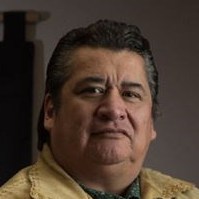
Chief Stacey Laforme
Chief of the Mississaugas of the Credit First Nation (MCFN)
Stacey Laforme is the elected Chief of the Mississaugas of the Credit First Nation (MCFN). Born and raised on MCFN, Chief Laforme has served his community for over eighteen years being first elected to council in 1999.
Chief Laforme has participated in a number of committees and boards throughout his seven terms served as a Councillor, including involvement with the MCFN’s Pan Am Games Secretariat (PAGS).
Chief Laforme is committed to increasing involvement and communication between Elected Council and both on and off-reserve membership. He is very active throughout MCFN’s traditional territory which encompasses 3.9 million acres of Southern Ontario, not only as a Chief, but as a notable storyteller and poet. Chief Laforme has recently been appointed as honorary senior fellow for Massey College, joining the Duke of Edinburgh and the Chancellor of Oxford as only the third person awarded the highest honor the college can bestow.
In 2018, Chief Laforme was awarded the Walter Cooke Wisdom Keeper Award in recognition of one’s capacity to exemplify significant and continuous services to his community by demonstrating integrity, generosity of spirit, humility, courage, collaboration, “The Good Mind”, and traditional ways of knowing and being.
-
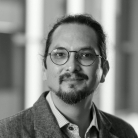
Prof. Douglas Sanderson
Associate Professor in the Faculty of Law at the University of Toronto and Opaskwayak Cree Nation
Douglas Sanderson (Amo Binashii) was managing editor of the inaugural edition of the Indigenous Law Journal in 2002 while a student in the JD program at the University of Toronto. He went on to get his LL.M from Columbia University. Prof. Sanderson is a member of the Opaskwayak Cree Nation, and he has been deeply engaged in Aboriginal issues from a policy perspective. From 2004-2007 he was a Senior Advisor to the Government of Ontario, first in the Office of the Minister Responsible for Aboriginal Affairs, and later, to the Attorney General. From 2007 to 2009, he was a Visiting Research Fellow at the University of Toronto Faculty of Law.
Prof. Sanderson’s research areas include Aboriginal and legal theory, as well as private law (primarily property law) and public and private legal theory. His work uses the lens of material culture and property theory to examine the nature of historic injustice to Indigenous peoples and possible avenues for redress. Moving beyond the framework of common law property rights and constitutional land/treaty rights, his scholarship focuses on Aboriginal institutions, post-colonial reconciliation and rebuilding community.
-
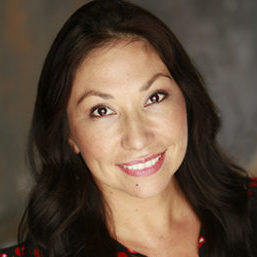
Trina Moyan
Nehiyaw iskwew (Plains Cree) from the Frog Lake First Nation in Northern Alberta
Trina is nehiyaw iskwew (Plains Cree) from the Frog Lake First Nation in Northern Alberta, Treaty 6 medicine chest territory. Tkaronto became her second home 16 years ago and she is honoured to work and raise her family upon the lands of the ‘Dish with One Spoon’ treaty. She began her career as a writer and producer for the Aboriginal Peoples Television Network (APTN) and she co-produced and directed the National Aboriginal Achievement Awards (now Indspire) for CBC television. Trina is a co-founder of Bell & Bernard, a First Nations consulting firm. She is a University of Toronto (U of T) alumna, a member of the Toronto Indigenous Business Association and a community activist. Trina’s life and work is inspired by her two sons and her mother Jeanne – a residential school survivor.
-
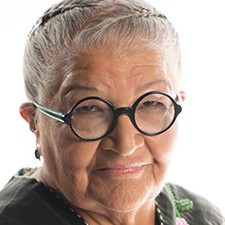
Jan Kahehti:io Longboat
Turtle Clan of the Mohawk Nation, Member of the Elders’ Circle
Jan Kahehti:io Longboat, Turtle Clan of the Mohawk Nation, is an Elder, educator, writer, herbalist, cultural advocate, and visionary, having dedicated her life to the dissemination and learning of Indigenous language and culture. A recipient of the Order of Canada Award, Jan Longboat is currently an Elder Advisor to the Ministry of Justice: Indigenous Peoples’ Court in Brantford. She taught at Mohawk College, McMaster University, and the University of Toronto, and has worked with several Indigenous health centres including Wabano, Desdwadadesnye, and SOHAK. She is a valued member of the Elders’ Circle at the University of Toronto.
Hart House has a long history of facilitating future-thinking conversations that in themselves became historic occasions. As part of our 100th Anniversary celebrations, from May 2019 through May 2020, Hart House will host a Centennial Dialogue Series consisting of 4 special events – each featuring a reimagining of one of the key debates from the past. Set in Hart House’s Great Hall, this series will feature topics that are still essential today – presented with contemporary participants, context, formats, and nuance. Come and see the power of conversation at work in Hart House’s 100th Anniversary Centennial Dialogue Series.
